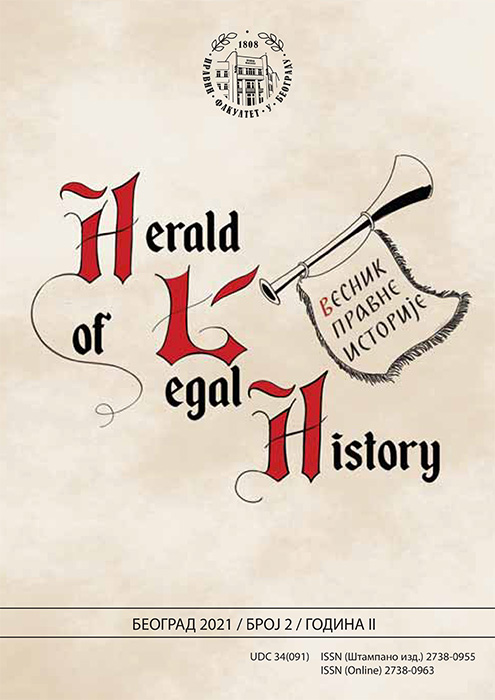THE ROLE OF JUPITER IN THE ARGUMENTATIVE SYSTEM OF CICERO’S ORATIONS
Abstract
Roman comprehension of the divine right entailed the completion of earlier, binding treaties between humans and deities. Cicero himself firmly believed in this ius divinum of the State.
As the supreme deity, Jupiter was unsurpassed in Rome. Even triumphs were tightly connected to Jupiter’s cult. When Cicero began his career, with his orations against Q. Caecilius and, subsequently, against Verres, Roman society was still reeling from the aftershocks of Sulla’s regime. Cicero’s consulate in 63 BCE and his actions during Catiline’s rebellion mark another rise in Cicero’s citing of Jupiter. During the aftershocks of Caesar’s death, Cicero turns to religion and Rome’s supreme deity to lend him authority and influence over the members of the Senate,
We strongly believe there is more to be gleaned from this, often neglected, aspect of Cicero’s orations, not only about Cicero’s attitude towards religion, but also about the Roman society and the place of religion within it.
References
SOURCES:
Harold Edgeworth Butler, Quintilian. With an English Translation, Cambridge 1921.
Anthony C. Clark, M. Tulli Ciceronis Orationes. Oxonii 1908.
Anthony C. Clark, M. Tulli Ciceronis Orationes. Oxonii 1909.
Anthony C. Clark, M. Tulli Ciceronis Orationes. Oxford 1918.
Henry Furneaux, Cornelius Tacitus: Opera Minora. Oxford 1900.
Eduardus Stroebel, M. Tullius Cicero: Rhetorici Libri Duo Qui Vocantur De Inventione, Lipsiae 1915.
Guielmus Peterson, M. Tvlli Ciceronis Orationes: Divinatio in Q. Caecilivm. In C.
Verrem, Oxford 1917.
Domini c H. Berry, Cicero: Political Speeches, Oxford University Press, Oxford 2006.
Charles D. Yonge, The Orations of Marcus Tullius Cicero, Volumes I-IV, London 1913–1917.
LITERATURE:
Clifford Ando, Roman Religion, Edinburgh University Press, Edinburgh 2003.
Mary Beard, John North, Simon Price, Religions of Rome: Volume 1, Cambridge University Press, Cambridge 1998.
Georges Dumézil, La religion romaine archaïque, Paris 1987.
Christopher P. Craig, Form as Argument in Cicero’s Speeches, Scholars Press, Georgia 1993.
Christopher P. Craig, “Dilemma in Cicero’s Divinatio in Caecilium”, The American Journal of Philology, Vol. 106, No. 4 1985.
Julia D. Hejduk, The God of Rome: Jupiter in Augustan Poetry, Oxford University Press, Oxford 2020.
Joanna Kenty, Cicero’s Political Personae, Cambridge University Press, Cambridge 2020.
Andrew Lintott, Cicero as Evidence: A Historian’s Companion, Oxford University Press, Oxford 2008.
Duncan MacRae, Legible Religion: Books, Gods, and Rituals in Roman Culture, Cambridge University Press, Cambridge 2016.
James M. May (ed.), Brill’s Companion to Cicero, BRILL, London 2002.
Jonathan Powell, Jeremy Paterson, Cicero the Advocate, Oxford University Press, Oxford 2004.
Jaan Puhvel, Comparative Mythology, Johns Hopkins University Press, London 1987.
Jörg Rupke (ed.), A Companion to Roman Religion, Blackwell Publishing, Malden 2007.
Howard H. Scullard, From the Gracchi to Nero, New York 1959.
Kathryn Tempest, Cicero: Politics and Persuasion in Ancient Rome, London 2011.
William Warde Fowler, Roman Ideas of Deity in the Last Century Before the Christian Era, Eugene 2008.
William Warde Fowler, Social Life at Rome in the Age of Cicero, Charleston 2006.
Roger Woodard, Myth, Ritual and the Warrior in Roman and Indo-European Antiquity, Cambridge University Press, Cambridge 2013.
Roger Woodard, Indo-European Sacred Space: Vedic and Roman Cults, University of Illionois Press, Urbana 2006.





